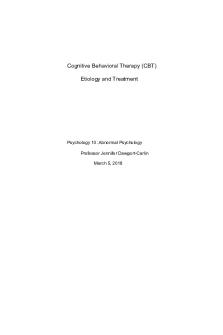Ch 7 Behavioral and Social Cognitive Approaches PDF

| Title | Ch 7 Behavioral and Social Cognitive Approaches |
|---|---|
| Author | Chelsea Blackwell |
| Course | Educational Psychology |
| Institution | Kennesaw State University |
| Pages | 5 |
| File Size | 134.2 KB |
| File Type | |
| Total Downloads | 18 |
| Total Views | 195 |
Summary
Follow these notes exactly. They are directly from the quiz...
Description
Thursday, May 17, 2018
Ch.7: Behavioral and Social Cognitive Approaches Ivan Pavlov—Classical Conditioning! Classical Conditioning—type of learning in which an organism learns to connect or associate stimuli. A neutral stimulus becomes associated with a meaningful stimulus and acquires the capacity to elicit a similar response.! TERMS
1. Unconditioned Stimulus (UCS) a stimulus that automatically produces a response without any prior learning! ex: food, fire! 2. Neutral Stimulus (NS) a stimulus that does not produce any response! 3. Unconditioned Response (UCR) an unlearned response/ a reflex action that is automatically elicited bu UCS! ex: salivation, scream! 4. Conditioned Stimulus (CS) previously neutral stimulus that eventually elicits a conditioned response after being associated with the UCS—it is learned! 5. Conditioned Response (CR) a learned response to the conditioned stimulus that occurs after USC-CS pairing ! CLASSICAL CONDITIONS PROCESS: ANOTHER PERSPECTIVE
Step 1: NS (bell)—(no response)! Step 2: NS (bell) then UCS (meat)—UCR (salivate)! Step 3: CS (bell)—CR (salivate)!
1
Thursday, May 17, 2018 CLASSICAL CONDITIONING PRINCIPLES
Generalization the tendency of a new stimulus similar to the original conditioned stimulus to produce a similar response ! Discrimination the organism responds to certain stimuli but not others! Extinction the weakening of the conditioned response (CR) in the absence of the unconditioned stimulus (UCS)!
Educational Implications of Classical Conditioning! • Practice is important (stimulus-response repetitions strengthens habits)! • Students should encounter academic subject matter in a positive climate and associate it with positive emotions (math anxiety)! • Assessing learning involves looking for behavior changes (higher test scores, improved athletic performance, more appropriate social interaction skills, or better study habits)!
Skinner’s Operant/ instrumental Conditioning! a form of learning in which the consequences of behavior produce change in the probability that the behavior will occur! Reinforcement increases the probability that a behavior will occur! Punishment decreases the probability that a behavior will occur!
REINFORCEMENT
PUNISHMENT
2
TYPE
CONSEQUENCE
BEHAVIOR CHANGE
positive
give good
increase
negative
take-away bad
increase
negative
take-away good
decrease
positive
give bad
decrease
Thursday, May 17, 2018 OPERANT CONDITIONING PRINCIPLES
Generalization giving the same response to similar stimuli! Discrimination differentiating among stimuli or environmental events! Extinction previously reinforced response is no longer reinforced and the response decreases!
Select Best Reinforcement Schedules! 1. Fixed-Ratio—reinforce after a set number of responses! 2. Variable-Ratio—reinforce after an average but unpredictable number of responses! 3. Fixed-Interval—reinforce appropriate response after a fixed amount of time! 4. Variable-Interval—reinforce appropriate response after a variable amount of time!
Educational Implications of Operant Conditioning • Reinforcing and punishing behaviors to see change! • Programmed instruction! • done in small steps, with the learner being an active participant (rather than passive), and that immediate corrective feedback is provided at each step • Applied Behavioral Analysis(ABA)—applied in all settings!
Bandura’s Social Cognitive Theory! Social/Environment, Cognitive/Person, and Behavioral factors play important roles in learning! PERSON/COGNITIVE FACTORS (COGNITION PLAYS A ROLE IN LEARNING—)!
• Awareness! • Beliefs! • Attitudes!
3
• Self efficacy! • Strategies!
• Intelligence! • Expectation ! • Attention!
• Retention!
• Personality traits&temp erament&
Thursday, May 17, 2018 BANDURA’S RECIPROCAL DETERMINISM
•Self-efficacy (person/cognitive factor): the belief that one can master a situation and produce positive outcomes! •Observational learning occurs when a person observes and imitates someone else’s behavior!
Observational Learning: ! PROCESSES NECESSARY FOR EFFECTIVE MODELING:
ATTENTION! students must attend to what a model is doing or saying
RETENTION! students must code information and keep it in memory so that they can retrieve it
PRODUCTION! students must be able to reproduce the model’s behavior
MOTIVATION! students must be motivated to imitate the modeled behavior
Educational Implications of Social Cognitive Theory! • Teacher and peers as models!
4
Thursday, May 17, 2018 • Cognitive Behavior Approaches: changing behavior by getting individuals to monitor, manage, and regulate their own behavior rather than letting it be controlled by external factors! • Self Instructional Method: cognitive behavior techniques aimed at teaching individuals to modify their own behavior (see p.254 for strategies)! • Self-Regulatory Learning: the self-generation and self-monitoring of thoughts, feelings, an behaviors in order to reach a goal!
5...
Similar Free PDFs

Ch 7- cognitive notes
- 2 Pages

Essay - Social Cognitive theory
- 6 Pages

Chapter 7 Cognitive psych
- 5 Pages

Ch 7 Tempo and Dynamics
- 5 Pages

Critical and Feminist Approaches
- 6 Pages

Approaches
- 12 Pages
Popular Institutions
- Tinajero National High School - Annex
- Politeknik Caltex Riau
- Yokohama City University
- SGT University
- University of Al-Qadisiyah
- Divine Word College of Vigan
- Techniek College Rotterdam
- Universidade de Santiago
- Universiti Teknologi MARA Cawangan Johor Kampus Pasir Gudang
- Poltekkes Kemenkes Yogyakarta
- Baguio City National High School
- Colegio san marcos
- preparatoria uno
- Centro de Bachillerato Tecnológico Industrial y de Servicios No. 107
- Dalian Maritime University
- Quang Trung Secondary School
- Colegio Tecnológico en Informática
- Corporación Regional de Educación Superior
- Grupo CEDVA
- Dar Al Uloom University
- Centro de Estudios Preuniversitarios de la Universidad Nacional de Ingeniería
- 上智大学
- Aakash International School, Nuna Majara
- San Felipe Neri Catholic School
- Kang Chiao International School - New Taipei City
- Misamis Occidental National High School
- Institución Educativa Escuela Normal Juan Ladrilleros
- Kolehiyo ng Pantukan
- Batanes State College
- Instituto Continental
- Sekolah Menengah Kejuruan Kesehatan Kaltara (Tarakan)
- Colegio de La Inmaculada Concepcion - Cebu









